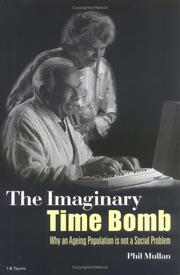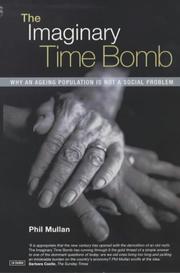| Listing 1 - 5 of 5 |
Sort by
|

ISBN: 186064452X Year: 2000 Publisher: London New York I.B. Tauris
Abstract | Keywords | Export | Availability | Bookmark
 Loading...
Loading...Choose an application
- Reference Manager
- EndNote
- RefWorks (Direct export to RefWorks)
Pensions. --- Aging --- -Aging --- -331.252 --- Age --- Ageing --- Senescence --- Developmental biology --- Gerontology --- Longevity --- Age factors in disease --- Compensation --- Pension plans --- Retirement pensions --- Superannuation --- Retirement income --- Annuities --- Social security individual investment accounts --- Vested benefits --- Economic aspects --- Social aspects --- Physiological effect --- Human services --- Older people --- Economic aspects. --- Government policy --- Forecasting. --- Social conditions. --- Demographic transition
Book
ISBN: 9781839825637 9781839825606 9781839825620 Year: 2020 Publisher: Bingley Emerald Publishing
Abstract | Keywords | Export | Availability | Bookmark
 Loading...
Loading...Choose an application
- Reference Manager
- EndNote
- RefWorks (Direct export to RefWorks)
Book
ISBN: 1447336135 Year: 2017 Publisher: Bristol : Policy Press,
Abstract | Keywords | Export | Availability | Bookmark
 Loading...
Loading...Choose an application
- Reference Manager
- EndNote
- RefWorks (Direct export to RefWorks)
Western economies have become stuck in a protracted depression that began long before the 2008 crash. Low productivity, which started in the 1970s, has prevented durable rises in living standards. Phil Mullan shows that the only way to ensure a better future is to create one, calling for a comprehensive economic restructure backed by political and cultural change. This means embracing the uncomfortable disruption involved in progressive change, rekindling in democratic form a spirit of Enlightenment thinking. The votes for Brexit and in the US presidential elections in 2016 indicate that many people desire change, offering greater opportunity for this public discussion. What is needed is a new industrial revolution which develops a broad range of emerging and yet unimagined services and products, provides decent jobs and restores prosperity. Providing examples of the new technologies needed to drive change, backed up by a wealth of data, this important book calls for a sea-change in imagination and thinking.

ISBN: 1860647782 Year: 2002 Publisher: London Tauris
Abstract | Keywords | Export | Availability | Bookmark
 Loading...
Loading...Choose an application
- Reference Manager
- EndNote
- RefWorks (Direct export to RefWorks)
Modern economies are faced with a time bomb ticking inexorably and portending economic disaster attended by political and social chaos. Economic slowdown in advanced industrialized countries will be caused by an ageing population. There will be a marked absence of the "feelgood factor", and there will be a downward economic spiral. This book discusses what will happen when the "baby boom" generation reach their sixties and seventies. It is often suggested that there will be slower growth rates, higher taxes, and inter-generational conflict. Phil Mullan turns these popular arguments on their head: the growing preoccupation with ageing has nothing to do with demography in itself and should be seen as a scapegoat for changes in economy and society, and as a compelling pretext for reducing the role of the state in the economy. Demonstrating that the problem of ageing is used as an anti-state and anti-welfare argument, Mullan demolishes a succession of myths about the ageing time bomb.
Aged --- -Aged --- -Aging --- -Human services --- -Government policy --- -Forecasting --- Social conditions --- Economic aspects --- Economic aspects
Book
ISBN: 183982560X Year: 2020 Publisher: Bingley, England : Emerald Publishing,
Abstract | Keywords | Export | Availability | Bookmark
 Loading...
Loading...Choose an application
- Reference Manager
- EndNote
- RefWorks (Direct export to RefWorks)
International relations. --- International economic relations. --- World politics.
| Listing 1 - 5 of 5 |
Sort by
|

 Search
Search Feedback
Feedback About UniCat
About UniCat  Help
Help News
News